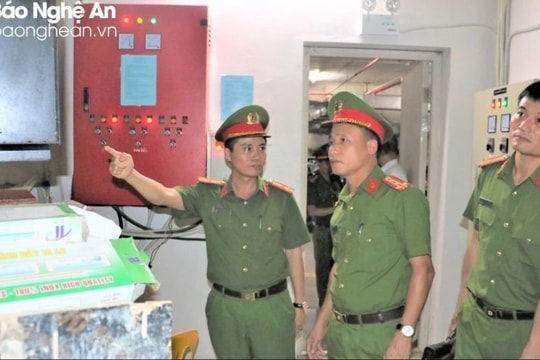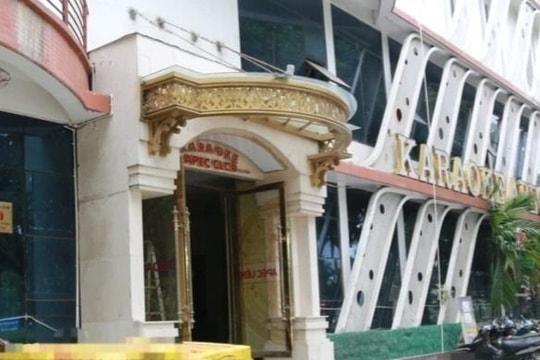Difficulty in collecting music copyright fees at karaoke businesses
(Baonghean) -The Vietnam Music Copyright Protection Center under the Vietnam Musicians Association was established in 2002. In 2013, it set up a representative office and collected music copyright fees at karaoke establishments in Nghe An. However, since then, the annual revenue has remained very modest.
The habit of "freeloading"
According to statistics, currently in the whole province there are about more than 500 licensed karaoke businesses, of which Vinh City accounts for the majority with more than 300 establishments, the rest are scattered in districts, towns, and communes... In recent years, the general level of economic and social life has gradually improved, so the need to enjoy cultural and entertainment activities of the people has also increased.
Along with other forms of entertainment, karaoke establishments have a stable number of customers, investment in technical equipment is focused. On average, each karaoke establishment in Vinh City has about 10 - 15 singing rooms, speaker systems, amplifiers, and modern decoration. Depending on the scale, the amount of investment in construction can range from several hundred million VND to billions of VND.
Willing to make huge investments in facilities, however, when asked about paying music copyright fees, many karaoke business owners hesitate, even outright refuse, even though those songs are the "fishing rod" that brings them daily profits.
Mr. Phan Dang H. - a karaoke business owner on Nguyen Van Cu Street (Vinh City) expressed his opinion that he had spent money to buy a karaoke player, which included songs, which meant he had already bought those songs, so why did he still have to pay copyright fees?
Similarly, a karaoke business owner in Ben Thuy ward (Vinh city) expressed his indignation, saying that the fact that the songs were chosen by customers to sing was a joy and honor for the musicians, so why should they still have to pay a fee? If they pay such a fee, the businesses would have to calculate and raise the price to compensate, so how should they explain to the customers?
Many business owners make excuses, always turning on the CD player for customers to sing freely, only knowing that they have to pay business tax, electricity and water bills... but why do they have to pay copyright fees? Many regular customers of karaoke bars, when asked, most of them do not know what copyright fees are!
 |
| A karaoke business street in Vinh city. Illustrative photo |
In the city, the situation is even more difficult for karaoke businesses in districts, towns and communes. Ms. Ngo Thi Bich Thuy - representative of the Vietnam Music Copyright Protection Center in Nghe An said that very few karaoke businesses in districts, towns and communes... seriously pay copyright fees. Currently, because it is not possible to accurately count the songs as well as the number of songs and music used in karaoke bars, the copyright fees are collected based on the number of rooms/month or year. The collection rate in Nghe An is quite "soft" compared to many other provinces and cities.
Specifically, the collection rate is 1,320,000 VND/room/year for wards in Vinh City; 1,100,000 VND/room/year for wards in Cua Lo Town, Hoang Mai Town, Thai Hoa Town and towns under districts; 880,000 VND/room/year in communes. For karaoke businesses with many rooms, the progressive calculation method is applied towards price incentives. In particular, only 70% of the above price is applied to karaoke businesses that are war invalids, families of martyrs, poor households, and those in especially difficult circumstances that operate with 2 rooms or less...
Although the price list is public and there are legal regulations to protect it, many karaoke businesses in districts, towns and communes still do not comply with paying copyright fees, or pay irregularly and incompletely. That is only referring to large-scale, reputable karaoke businesses, while many small-scale businesses located in communes and hamlets... are difficult to control.
| Statistics from the Vietnam Music Copyright Protection Center in Nghe An show that in 2016, the royalties collected from karaoke businesses were just over 285 million VND - a rather modest figure. The habit of "free use" and free use seems to have become a natural thing in the minds of a large number of people, making it difficult to collect royalties overnight! |
Increase propaganda and apply sanctions
In 2013, when the Vietnam Music Copyright Protection Center established a representative office in Nghe An, it coordinated with the Department of Culture and Sports (at that time the Department of Culture, Sports and Tourism) to organize training on the Law on Intellectual Property and related legal documents on copyright issues. Along with that, the Department also sent documents to the People's Committees of districts, towns and cities, requesting strict compliance with inspection, supervision, and regular reminders on the implementation of copyright fees at karaoke businesses.
Mr. Le Khac Hoang - Deputy Chief Inspector of the Department of Culture and Sports said that although the Department is not the direct collection unit, it is responsible for guiding and inspecting the implementation of legal documents. Therefore, every year, the Department's inspectors conduct inspections on compliance with music copyright fees. When inspecting karaoke businesses, if the owner cannot provide a certificate of payment of music copyright fees provided by the Vietnam Center for Music Copyright Protection, depending on the level of violation, the Department's inspectors will issue a warning and have the authority to apply sanctions according to regulations.
However, Deputy Chief Inspector Le Khac Hoang also frankly acknowledged the fact that the inspection and collection of music copyright fees still faces many difficulties due to limited human resources of the Department's inspection department and the district's Department of Culture and Information. Every year, the inspection task must be carried out in many fields, in large areas, and with a large number of business establishments.
Up to now, the Department has not yet imposed a penalty on any karaoke business that has not paid music copyright fees because it is still "leaning" towards the main method of propaganda, raising awareness and compliance, because the issue of music copyright is still quite new to many people, and it takes time for them to accept it.
In the coming time, to improve the compliance with the law on music copyright in the area, the Department's inspectors will be more strict in handling violations. Accordingly, sanctions will be applied according to Clause 3, Article 29, Decree 131/2013/ND-CP stipulating administrative sanctions for violations of copyright and related rights, with a fine of 15,000,000 - 25,000,000 VND for the act of using published audio and video recordings for commercial purposes in karaoke service establishments without paying the copyright owner or related rights owner according to regulations.
Along with that, continue to promote propaganda and dissemination of legal knowledge on mass media, to raise awareness for people in general and karaoke business owners in particular. How to make people understand that karaoke is a collective intellectual product, from composers, arrangers, MV filmmakers, image makers... and the view of "free use" is wrong and needs to be stopped./.
Phuong Chi


.jpg)


